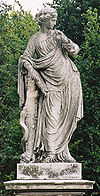
Angerona
Encyclopedia

Roman mythology
Roman mythology is the body of traditional stories pertaining to ancient Rome's legendary origins and religious system, as represented in the literature and visual arts of the Romans...
, Angerona or Angeronia was an old Roman goddess, whose name and functions are variously explained. She is sometimes identified with the goddess Feronia
Feronia
Feronia may mean:* Feronia , a goddess of fertility in Roman and Etruscan mythology* Feronia , a genus of plants* Feronia Inc., a plantations company operating in the Democratic Republic of the Congo...
.
According to ancient authorities, she was a goddess who relieved men from pain and sorrow, or delivered the Romans and their flocks from angina (quinsy). Also she was a protecting goddess of Rome and the keeper of the sacred name of the city, which might not be pronounced lest it should be revealed to her enemies. It was even thought that Angerona itself was this name; a late antique source suggests it was Amor, i.e. Roma inverted. Sorania and Hirpa have also been put forward as candidates for the secret name. Modern scholars regard her as a goddess akin to Ops
Ops
In ancient Roman religion, Ops or Opis, was a fertility deity and earth-goddess of Sabine origin.-Mythology:Her husband was Saturn, the bountiful monarch of the Golden Age. Just as Saturn was identified with the Greek deity Cronus, Opis was identified with Rhea, Cronus' wife...
, Acca Larentia
Acca Larentia
Acca Larentia or Acca Larentina was a mythical woman, later goddess, in Roman mythology whose festival, the Larentalia, was celebrated on December 23.-Foster mother:...
, and Dea Dia
Dea Dia
In Roman mythology, Dea Dia is the goddess of growth. She was sometimes identified with Ceres, and sometimes with the equivalent Greek goddess Demeter....
; or as the goddess of the new year and the returning sun (according to Mommsen, ab angerendo = ἀπὸ τοῦ ἀναφέρεσθαι τὸν ἥλιον). Her festival, called Divalia
Divalia
The Divalia was a Roman festival held on December 21st, in honour of the goddess Angerona, whence it is also called Angeronalia. On the day of this festival the pontifices performed sacrifices in the temple of Voluptia, or the goddess of joy and pleasure, who, some say, was the same with Angerona,...
or Angeronalia, was celebrated on the 21st of December. The priests offered sacrifice in the temple of Volupia, the goddess of pleasure, in which stood a statue of Angerona, with a finger on her mouth, which was bound and closed (Macrobius i. 10; Pliny
Pliny the Elder
Gaius Plinius Secundus , better known as Pliny the Elder, was a Roman author, naturalist, and natural philosopher, as well as naval and army commander of the early Roman Empire, and personal friend of the emperor Vespasian...
, Nat. Hist. iii. 9; Varro
Marcus Terentius Varro
Marcus Terentius Varro was an ancient Roman scholar and writer. He is sometimes called Varro Reatinus to distinguish him from his younger contemporary Varro Atacinus.-Biography:...
, L. L. vi. 23). She was worshipped as Ancharia at Faesulae, where an altar belonging to her has been discovered. In art, she was depicted with a bandaged mouth and a finger pressed to her lips, demanding silence.
For further reading
- Hendrik WagenvoortHendrik WagenvoortHendrik Wagenvoort was a Dutch classical scholar. He was professor of Latin at the University of Groningen and Utrecht University and published extensively on subjects relating to the Latin language and Roman religion....
, "Diva Angerona," reprinted in Pietas: Selected Studies in Roman Religion (Brill, 1980), pp. 21–24 online.

